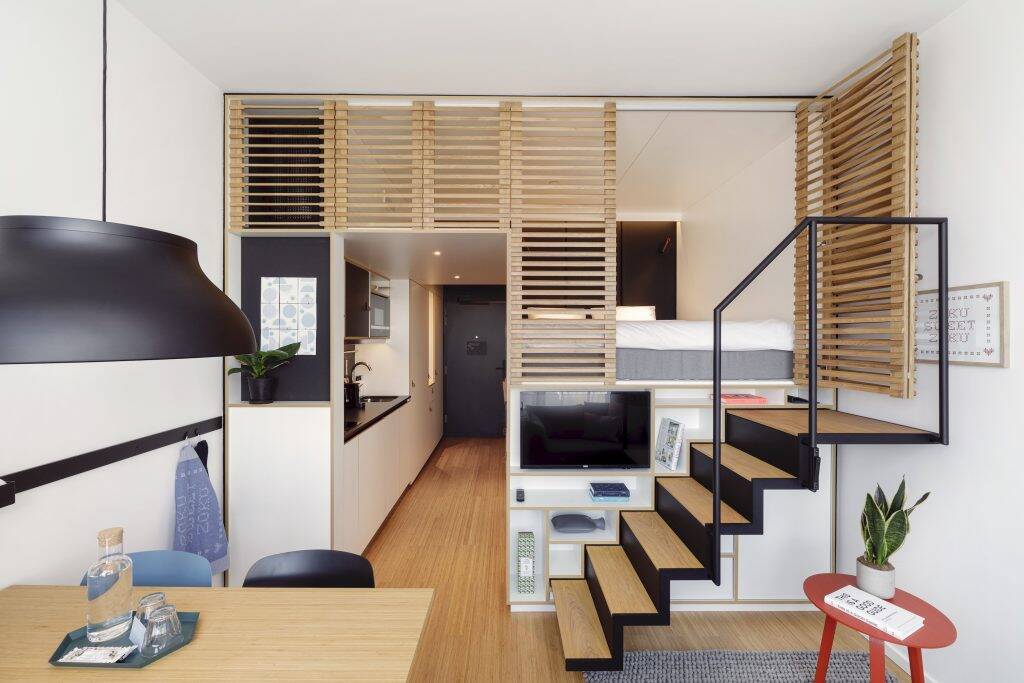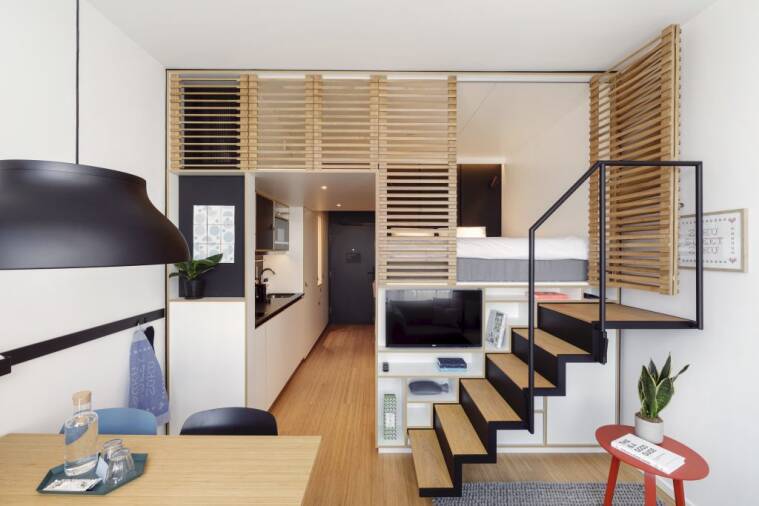6 min
Lisa Appels Kees van Duinhoven Wouter Noordijk
The way we work is undergoing a transformation. For centuries, we were tied to our workplaces, but a global pandemic made sitting at the same desk, in the same building every day, no longer the norm for a new generation of professionals. Digital nomads – entrepreneurs, freelancers or remote workers – don’t need a fixed location to accomplish their professional goals. Their bare necessities amount to a laptop and a good internet connection. The phenomenon of digital nomads has been on the rise for several years, but the pandemic has accelerated developments around traveling and working remotely..
An innovative hotel concept targets remote workers and digital nomads
At Zoku, hotel, home and workplace come together
video
Zoku's first location opened in Amsterdam in 2016, and is located just minutes from the center of Amsterdam in the Eastern Canal District. It has 133 lofts, as well as the famous Zoku greenhouse and roof garden. In 2021, Zoku's first two locations outside the Netherlands opened, in Copenhagen and Vienna, with the Copenhagen location being the largest to date. In the coming years, the company hopes to expand to more cities within Europe, starting with Zoku Paris, whose opening is scheduled for Fall 2022.
A key component of Zoku is the emphasis on social connection. Meyer: "That's what people really can't do without." Back in 2009, Meyer and his business partner Marc Jongerius started the preliminary work for Zoku, with the foresight that more individuals were going to combine travel and work in the near future.
Human connection
To encourage human connection, Zoku integrated all sorts of elements in their concept and design. For example, there is a community manager, who is also – jokingly – called the ‘built in best friend’, says Tori Campbell – community manager of Zoku Copenhagen. She helps guests who are staying at Zoku for a longer period of time with practical matters such as opening a bank account and arranging the right health care, but also provides them all the latest intel on the best bars and restaurants in the city. She even sits down with them at Zoku’s rooftop bar for a glass of wine after a hard day's work. Tori isn’t the only one providing a feeling of genuine hospitality, as Zoku is designed with social connection in mind. In the ‘Living Kitchen’ guests eat together – like a real family – at long tables, and The Kindred Spirits Bar is designed to create a living room atmosphere. At the same time, there are unique areas available to work in the building, both in open spaces and in more enclosed alcoves. In Meyer's words, Zoku is a combination of home and office, combining the services and service of a hotel with the social buzz of a vibrant neighborhood."
Working in the future
"During that time, I saw more and more people starting to do work remotely, and I wanted to be able to cater to what a 'working person in the future' needed. So I started to do some fieldwork." Meyer conducted a number of interviews and, for ultimate research purposes, he became a 'remote worker' himself for several months in different cities around the world. What struck him most was the loneliness that came with remote working. Now, more than a decade later, and accelerated by the pandemic, most people no longer work from a standard office or workplace. What Meyer has noticed is that many working people miss personal and human connections within their work life, and during lockdown. “The loneliness of working remotely has been exacerbated by COVID-19.”
A concept that taps into the market of this new generation of remote workers is Zoku, a hybrid hotel concept where home and office blend together, according to the Dutch founder Hans Meyer. Their target group: long-stay guests who work and live in a city that is not their own, but where they plan to stay for a longer period of time.

6 min
Lisa Appels Kees van Duinhoven Wouter Noordijk
The way we work is undergoing a transformation. For centuries, we were tied to our workplaces, but a global pandemic made sitting at the same desk, in the same building every day, no longer the norm for a new generation of professionals. Digital nomads – entrepreneurs, freelancers or remote workers – don’t need a fixed location to accomplish their professional goals. Their bare necessities amount to a laptop and a good internet connection. The phenomenon of digital nomads has been on the rise for several years, but the pandemic has accelerated developments around traveling and working remotely..
An innovative hotel concept targets remote workers and digital nomads
At Zoku, hotel, home and workplace come together
Zoku's first location opened in Amsterdam in 2016, and is located just minutes from the center of Amsterdam in the Eastern Canal District. It has 133 lofts, as well as the famous Zoku greenhouse and roof garden. In 2021, Zoku's first two locations outside the Netherlands opened, in Copenhagen and Vienna, with the Copenhagen location being the largest to date. In the coming years, the company hopes to expand to more cities within Europe, starting with Zoku Paris, whose opening is scheduled for Fall 2022.
A key component of Zoku is the emphasis on social connection. Meyer: "That's what people really can't do without." Back in 2009, Meyer and his business partner Marc Jongerius started the preliminary work for Zoku, with the foresight that more individuals were going to combine travel and work in the near future.
Human connection
To encourage human connection, Zoku integrated all sorts of elements in their concept and design. For example, there is a community manager, who is also – jokingly – called the ‘built in best friend’, says Tori Campbell – community manager of Zoku Copenhagen. She helps guests who are staying at Zoku for a longer period of time with practical matters such as opening a bank account and arranging the right health care, but also provides them all the latest intel on the best bars and restaurants in the city. She even sits down with them at Zoku’s rooftop bar for a glass of wine after a hard day's work. Tori isn’t the only one providing a feeling of genuine hospitality, as Zoku is designed with social connection in mind. In the ‘Living Kitchen’ guests eat together – like a real family – at long tables, and The Kindred Spirits Bar is designed to create a living room atmosphere. At the same time, there are unique areas available to work in the building, both in open spaces and in more enclosed alcoves. In Meyer's words, Zoku is a combination of home and office, combining the services and service of a hotel with the social buzz of a vibrant neighborhood."
Working in the future
"During that time, I saw more and more people starting to do work remotely, and I wanted to be able to cater to what a 'working person in the future' needed. So I started to do some fieldwork." Meyer conducted a number of interviews and, for ultimate research purposes, he became a 'remote worker' himself for several months in different cities around the world. What struck him most was the loneliness that came with remote working. Now, more than a decade later, and accelerated by the pandemic, most people no longer work from a standard office or workplace. What Meyer has noticed is that many working people miss personal and human connections within their work life, and during lockdown. “The loneliness of working remotely has been exacerbated by COVID-19.”
A concept that taps into the market of this new generation of remote workers is Zoku, a hybrid hotel concept where home and office blend together, according to the Dutch founder Hans Meyer. Their target group: long-stay guests who work and live in a city that is not their own, but where they plan to stay for a longer period of time.










